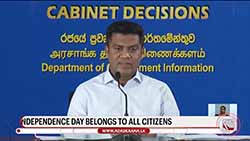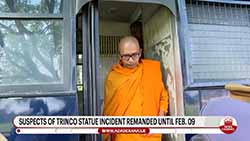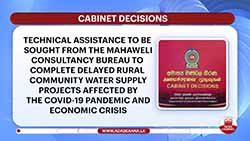Sri Lanka seeks MoU with India on nuclear power
April 3, 2012 07:04 am
The government of Sri Lanka says it proposed India to sign a memorandum of understanding (MoU) on nuclear disaster management.
The proposal was made considering dangers posed by India’s nuclear plants close to Mannar and northern Sri Lanka, Power and Energy Minister Patali Champika Ranawaka told BBC Sandeshaya.
“If there is a nuclear accident that causes radiation to escape in Koodankulum nuclear power plant or any other nuclear plant, that may affect Mannar and north,” he said.
Koodankulum nuclear plant is situated in a close proximity to Mannar bay and in the event of a nuclear disaster there is fear that northern parts of Sri Lanka may affect.
Disaster Management
“We have pointed out this to India and we are in the process of monitoring the radiation levels in the areas” Minister Ranawaka added.
Last week Tamil Nadu Chief Minister Jeyaram Jayalalitha gave the go-ahead to the plant and declared that the plant which was started in 1987 will finally start production within two months.
She managed to overcome the massive protest led by SP Udayakumar, a veteran anti-nuclear activist who campaigned against the Koodankulam nuclear plant.
According to S.P. Udayakumar, he gave up after government agreed to implement a disaster management programme and train people within thirty kilometres of the power plant to protect them in the event of a nuclear disaster.
Tamil Nadu is suffering from severe power shortages and routine power cuts had been introduced. Industries in the area badly hit by restricted power supplies.
Minister Ranawaka agrees with Tamil Nadu that the southern Indian state does not have any option other than nuclear power ‘at present’.
India should discuss
However, the minister says that it is the duty of the Indian government to ‘discuss issues surrounding nuclear energy with neighbouring Sri Lanka’ prior to commissioning power plants.
“We have proposed that India start negotiations on this matter in order to prepare a plan to face any nuclear emergency,” the minister told BBC Sandeshaya.
Environmentalists are not happy with the way Sri Lanka handling the issue. Reminding how ineffective Sri Lankan response to the Sethusamudram, Centre for Environmental Justice (CEJ) say that Sri Lanka should have registered its opposition more rigorously.
Hemantha Withanage of CEJ propose that Sri Lankans should join hands with the anti-nuclear campaigners in India.
“If we consider the nuclear disasters such as Long Island, Chernobyl and Fukushima, nuclear power is not as rosy as politicians portray,” he told BBC Sandeshaya.
Educate people
Nevertheless, nuclear experts say that people had been misinformed about the nuclear energy.
Dr Prinath Dias of Moratuwa University, who once was the chairman of Sri Lanka Atomic Energy Agency argues that risks are associated with any kind of energy production.
“If world needs energy and if it cannot use fossil fuels because of the greenhouse gases, we are left with nuclear energy,” he told BBC Sinhala service.
Citing the probability of a nuclear disaster he pointed out that number of people die because of traffic accidents are far greater than the number that can be perished from a nuclear disasters.
Professor Rohini Hewamanna of Nuclear Science Department – University of Colombo believes that people are scared of nuclear power because they are not fully educated about the subject.
“If we are running out of alternative energy sources we may have to consider nuclear energy and therefore it is important to educate the people and promote nuclear science as a discipline” she said, BBC reports.












